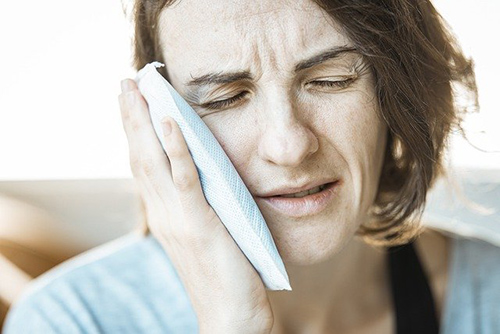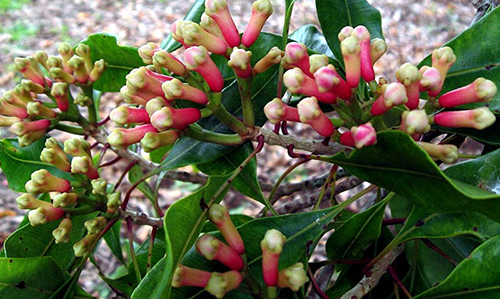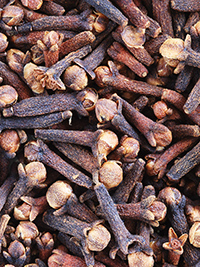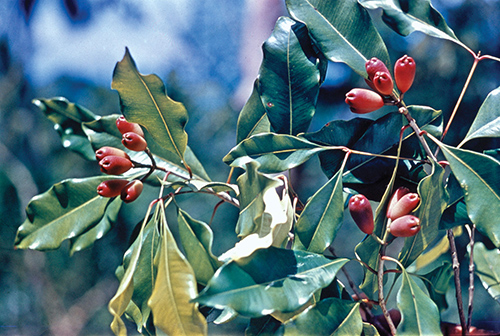Contents

Chinese physicians knew about the health benefits of cloves as far back as the Han Dynasty (206 B.C.-220 A.D.). Their writings mentioned the tree’s many properties, especially its ability to sweeten the breath. However, until the time of great journeys in the 16th century, the clove tree, like many other spices, came to Europe from India in minimal amounts. This fact made spices more expensive and precious. Thus, one of the main reasons Christopher Columbus started his sea journey was to look for a shorter route to the spice-producing countries, and clove was one of these spices.
Tropical spices were highly appreciated in Europe. According to the theory of signs, the clove was perhaps the most precious because it was regarded as a powerful aphrodisiac. Herbalists and apothecaries of the Middle Ages and the Renaissance saw in cloves the representation of an erect penis, with the testicles at its base. Therefore, it was supposed to act on the male genitalia.
Did Columbus know this before sailing west with his caravels? He probably did. Nevertheless, the discoverer never found the land where clove trees grew. The Portuguese seafarer Ferdinand Magellan and the Basque Juan Sebastian Elcano, the first to travel around the world, sailed on an expedition which, in 1520, arrived at the Moluccas Islands near China. On these Islands, they loaded cloves, bringing them to Spain as a precious treasure. Since then, the farming of clove trees has spread to all tropical regions.

Health Benefits of Cloves and Healing Properties
Cloves contain 15 to 20 percent of the essence, mainly formed by eugenol, along with small amounts of ACETYLEUGENOL, CARYOPHYLLENE, and METHYL N-AMYL KETONE. This essence is what gives cloves their aroma and their properties.
- Oral antiseptic and analgesic. Clove essence used as an oil is included in toothpaste, orally taken elixirs, and perfumes. Its antiseptic power is three times superior to that of phenol. It is recommended for stomatitis (inflammation of the mouth mucus membrane) or gingivitis (gum inflammation). In local applications, it can temporarily ease toothaches caused by tooth decay.
- It is a general stimulant of the body, though much milder than coffee.
- Appetizer (which stimulates the appetite) and carminative (eliminates intestinal gases).
A few drops of the oil from cloves in warm water can stop vomiting and nausea. Cloves possess antiparasitic and antiseptic properties in addition to the ability to aid digestion. It warms and stimulates the system, which helps those with cold extremities. Cloves can be added to bitter herb formulas to mask the taste and improve circulation and digestion.
This herb also promotes sweating in fevers, flu, and colds and is an excellent remedy for whooping cough. Thanks to its carminative properties, it is suitable for stopping intestinal spasms and expelling gas. You can apply clove oil to a toothache externally to help stop the pain.
WARNING! Those suffering from gastroduodenal ulcers or gastritis must abstain from consuming cloves, both as a medicinal plant and spice. In high doses, cloves act as an irritant on the digestive system, which is shown by nausea, vomiting, and stomach ache. Clove oil is very potent and irritates if utilized in its pure form. Use olive oil or distilled water to dilute the oil. Avoid taking undiluted oil internally.

Clove Tree Scientific Facts
- Scientific synonyms: Syzgium aromaticum (L.) Merr.-Perry. Caryophyllus aromaticus L.
- French: Giroflier, bois a clous.
- Spanish: Clavero, clavo de olor.
- Environment: Native to the Moluccas and the Philippines, it is grown in other tropical areas of Asia and America.
- Description: This tree is of the Myrtaceae family and grows from 10 to 20 meters high. The cloves are the flower buds gathered when they become red. After drying them under the sun, they acquire an ochre color.
- Parts of the plant used medicinally: Dried flower buds.
How to use Cloves

- Infusion, with two or three cloves per cup of water, drinking a cup with each meal.
- Essence. One to three drops before each meal.
- Spice. It must be sparingly used since a single clove is enough to spice a whole meal.
- Mouth elixir. Rinse with a glass of water, to which some drops of clove essence are added. It refreshes and disinfects the mouth.
- Toothache: To ease it, apply a piece of clove or a drop of clove essence to the aching tooth.
- Powder: Take one to five #0 capsules (2 to 10 grains) thrice daily.
- Fluid Extract: Take eight to thirty drops three times a day.
- Oil: Take one to two drops three times a day.
DISCLAIMER: All content on this website is presented solely for educational and informational objectives. Do not rely on the information provided as a replacement for advice, diagnosis, or treatment from a qualified medical expert. If you are pregnant, nursing, or have any preexisting medical concerns, talk to your doctor before using any herbal or natural medicines.
REFERENCES
- George D. Pamplona-Roger, M.D. “Encyclopedia of Medicinal Plants.” George D. Pamplona-Roger, M.D. Encyclopedia of Medicinal Plants. Ed. Francesc X. Gelabert. Vols. 1 San Fernando de Henares: Editorial Safeliz, 2000. 192, 193. Print. [health benefits of cloves]
- Vance Ferrell Harold M. Cherne, M.D. The Natural Remedies Encyclopedia [Book]. – Altamont, TN: Harvestime Books, 2010. – Vol. Seventh Edition: 7: pp. 153.
- Healthline: https://www.healthline.com/
- Cleveland Clinic: https://health.clevelandclinic.org/
